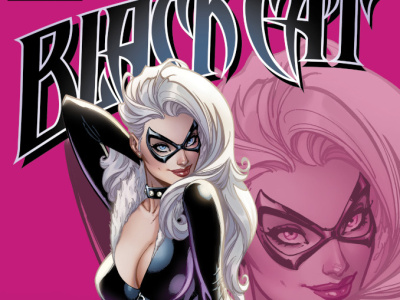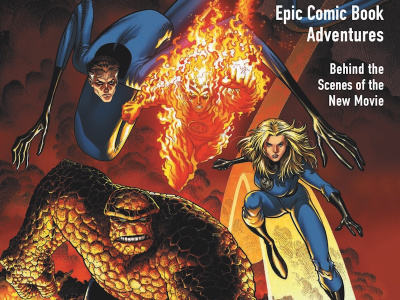 Talk the Talk, Walk the Walk is a weekly column by Kendall Swafford of Up Up Away! in Cincinnati, Ohio. This week, Kendall looks at the title count from Marvel, and the results.
Talk the Talk, Walk the Walk is a weekly column by Kendall Swafford of Up Up Away! in Cincinnati, Ohio. This week, Kendall looks at the title count from Marvel, and the results.A few weeks ago, I noticed a chart that I believe was published by John Jackson Miller. At the time, I was too busy fighting the never-ending battle for Superman #703, so I filed it away (at least mentally) so we could talk about it at a later date.
The chart was specific to the output of Marvel and DC versus their respective market share. I apologize, I don’t mean to be vague or talk in generalities; I just can’t find the damn chart! Anyway, the point of this specific chart was to illustrate how many more titles Marvel Comics is currently publishing vs. a few years ago, for little to no gain in market share.
My own data gathered from Diamond solicitations indicates that the number of periodical titles Marvel solicits for has risen a whopping 78% since 2006. DC’s output has remained relatively constant throughout the same period. The latest Diamond data gives Marvel a 45% unit share vs. DC’s 32% for August of 2010, and 42% to 35% for July). For the year 2006, Marvel had 42% to DC’s 36%.
Think about what that’s telling us for a minute. Marvel has nearly doubled the number of periodical line items they solicit for every month, for virtually no gain. A visiting Marvel writer to our store once told me that "Marvel realizes no title will ever sell a million copies again, but if they can get twenty titles to sell fifty-thousand copies (or fifty titles to sell twenty-thousand copies) then the math is the same." Now, unless I’m a complete idiot, I’m pretty sure the economics of publishing don’t scale down. A 78% gain in the number of titles means a dramatic increase in creative talent, editors, production staff and so on. Talk about running to stand still!
The path Marvel is on seems like the definition of insanity to me, and there appears to be no end in sight. I thought that once Disney had their fingers in Marvel’s pie for a few months that we’d see some evidence of change. At the moment however, Disney seems content to leave well-enough alone. It will be interesting to see if they take a custodial approach to Marvel as Time-Warner had historically with DC just as Time-Warner has chosen a more “entrepreneurial” path with DC, making them a far more important cog in their machine.
So, what does it all mean, anyway? Marvel proved with Civil War that a compelling product will pull readers in, both new and lapsed. Would quality win out over quantity? Hard to say where Marvel’s market share would be today if they’d kept their title count where it was back in '06, but I dare say it would be at least where it is now, if not higher. Do we really need Hit Monkey or Gorilla Man or Pet Avengers? No one wants fourteen mediocre X-Titles, we all want one or two REALLY good ones.
Here’s where the growth lies; my best-selling comic title currently is Brightest Day, but it’s only being purchased by 30% of my customers. My best selling Marvel title, The Avengers, is only bought by 19%! Fifteen percent buy New Avengers, and 14% buy Secret Avengers. Marvel will tell you that those numbers indicate that 48% of my customers are buying one of their Avengers titles, but that’s ludicrous. What it means is that 76% of their Avengers buyers buy more than one Avengers title. The market has become so fractured as to be unsustainable. Marvel and DC regularly publish books that would have cancelled even five years ago. I’ll give DC credit for being judicious about line extensions (unless your name is Batman), but Marvel thinks six Deadpool titles and eight Thor titles is a good idea! When Deadpool debuted back in 2008, it sold like gangbusters. Why? Because it was really good. "Well, if one Deadpool book is good, then five or six must be great!" Every additional title featured diminished quality, and diminished sales, and eventually tarnished the main Deadpool comic, which now just sells to the hardcore Deadpooligans.
God help me, I can’t find the logic. Maintaining the continuity of popular creators on a hot-selling book is not rocket science, it’s actually a formula for sustaining sales over a long period of time. Marvel has to stop assuming that a good-selling book has only one sales trajectory, down, and they have to stop both supporting that assumption by their actions and stop hiding that self-fulfilling prophecy behind ever-expanding line extensions. And I know, I know, Marvel isn’t the only one guilty here. But like it or not, as Marvel goes, so goes the rest of this industry. It’s been true for decades, unfortunately. We can either learn from this lesson, or doom ourselves by repeating it.
The opinions expressed in this column are solely those of the writer, and do not necessarily reflect the views of the editorial staff of ICv2.com.







